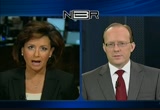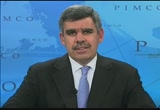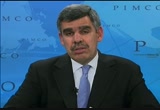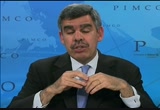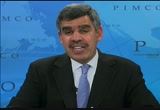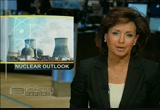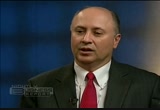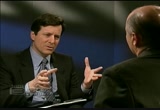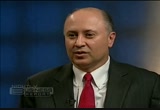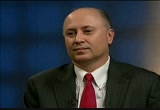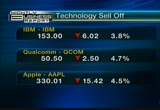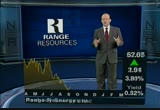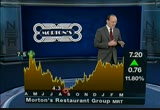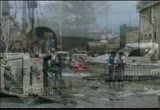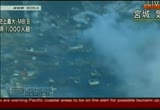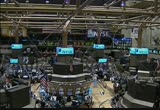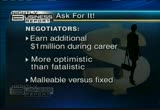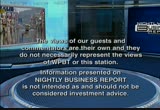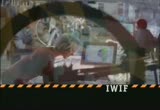tv Nightly Business Report PBS March 16, 2011 7:00pm-7:30pm EDT
7:00 pm
>> susie: investors face fear and confusion as japan's nuclear crisis continues. energy regulators around the globe warn about the risks and u.s. stocks get whipsawed. >> tom: as the situation unfolds, how is the nuclear industry responding to the escalating crisis? and what is in store for investors? you're watching "nightly business report" for wednesday, march 16. this is "nightly business report" with susie gharib and tom hudson. "nightly business report" is made possible by:
7:01 pm
this program is made possible by contributions to your pbs station from viewers like you. captioning sponsored by wpbt >> susie: good evening everyone. fears escalated today around the world about the nuclear crisis in japan. comments from energy officials in europe and the u.s. raised questions about danger from the damaged reactors, tom. >> tom: susie, these were stark comments from top global experts. europe's energy chief said japan's dai-ichi nuclear plant was "effectively out of control." the u.s. energy secretary
7:02 pm
said there was a "partial meltdown" there. additionally, americans within 50 miles of the area were urged to evacuate. >> susie: and tom, those warnings spooked u.s. stock investors, sending the major averages down sharply. but stocks rebounded slightly on word electric power may soon be restored to the crippled nuclear plant, preventing a full meltdown. looking at the numbers, the dow tumbled 242 points, the nasdaq fell 50 and the s&p 500 lost 25. joining us now, mohamed el-erian, c.e.o. and co- chief investment officer of pimco, the world's largest bond fund manager. hi, mohamed. >> hi, susie. >> susie: looks like the most serious question today is how bad is this nuclear situation in japan and what does it mean for japan and for us in the united states? >> that is a major question and a major uncertainty, susie, that's why the markets are so nervous. no one knows how bad it can get. everybody knows that there's a range of outcomes, and what
7:03 pm
the markets are now starting to price in is this uncertainty premium. this uncertainty premium applies to two things. one is what can happen in the next two days. and secondly how long will it take to restore full energy and electricity in japan. so you're getting both influences coming together, turbo charged by an element of uncertainty and markets do not like that. >> susie: right. and on top of the uncertainty about the nuclear crisis, there's also all the questions about the tremendous loss of life, the questions about the challenges of the rebuilding and reconstruction in japan. can the japan navigate through all of this? >> we think they can. but it's going to take time. so the tremendous human suffering, japan has also taken a hit to its national wealth, factories and roads have been destroyed. and secondly, its output will
7:04 pm
decline, so there's much less production and much less consumption going on. so what we'll expect to happen is first the focus is rightly going to be on human rescue, that is critical. and then we're going to embark on a public sector led reconstruction program. that will bring growth back up. but over time. the markets right now are coping with the reality that something bad has happened in the third largest economy in the world, with the uncertainty of what happens next, and with technical positions. in the sense that the market had come a very long way, some people felt it was extended, other people felt it was overextended. so you're getting this technical factor coming together with these other factors. >> susie: i'd like to get your outlook for stocks and also bonds. especially on bonds, because last week your colleague bill gross was on our program and told us that pimco was selling all its u.s. treasuries and
7:05 pm
now they've been rallying since his appearance. is it still safe to say that to stay away from treasuries and what's also your outlook on stocks? >> we can find better value, we think, in the fixed income market. so the fixed income market is much more than treasuries, there's lots of other bonds in the fixed income market that we believe offer better risk adjusted return over time. >> susie: like what? >> like, for example, certain very senior corporate bonds, where you get a advantage on the interest rate over treasury bonds and then near not as vulnerable. and there's other opportunities as well globally. it's important to remember that this is a global market. on the stock side, we are going to see a period of very volatile stock crisis as the markets price in this big uncertainty. and you're going to see it particularly also in the foreign exchange market. today the foreign exchange market was moving in ways that people didn't think was
7:06 pm
possible -- >> susie: i wanted to ask you about that, about the yen. because the yen are much stronger against the dollar, it's been building over the last couple of days. how worried should american consumers and investors be about that currency shift? >> well, you should worry when ever something moves very quickly in a short amount of time. and the yen has gone from 81 to 77 in a very short period of time. in literally 24 hours. that is a massive move, which means something is breaking somewhere, we don't know what yet is breaking, but something is breaking because you don't get sudden moves without someone being forced to do something because they have no choice. so we should all look out. over the long term, we should worry in the sense that the health of the japanese economy is key to the global economy. this is the third largest economy in the world. and a strong yen will not help the recovery of the japanese economy. >> susie: all right. so many issues going on there and we hope to get you back
7:07 pm
again and to analyze more as more becomes, more information becomes available. thank you so much for coming on the program tonight. >> thank you, susie. >> susie: we've been speaking with mohammed el-erian, chief investment officer of pimco. >> tom: here are the stories in tonight's n.b.r. newswheel: new home construction marked its biggest one-month decline in 27 years in february. housing starts fell 22.5% to a seasonally adjusted 479,000. national association of home builders economist paul crowe expected a drop due to bad weather and more multi-family building. but he also thinks the housing market still has bigger problems. >> even those factors don't account for the significant drop we saw, and i think that has more to do with the fragile housing recovery to begin with, and so any small wind blows us off track, or even backwards in this case.
7:08 pm
>> tom: meanwhile, another data point in on the economy, a big jump in inflation at the wholesale level. producer prices rose 1.6% in february, the sharpest jump in nearly two years. the culprit here? no surprise, higher energy and commodities costs. still ahead, with damage estimates in hundreds of the billions of dollars, we look at what it will take to start rebuilding japan. >> susie: as workers in japan struggle to limit the fallout from the nuclear crisis, china became the latest country to put its nuclear expansion plans on hold. but the companies that build nuclear power plants say they can operate safely. areva is one of them. this afternoon, darren gersh spoke with chief operating officer michael rencheck. he began by asking what lessons have been learned from the crisis in japan. >> we'll now take a look at what has happened in japan, not only from the aspects of
7:09 pm
the earthquake and the tsunami, but also from the response. factoring those lessons learned and how we practice our operations and how our regulations are set up and structure toured here in the united states. >> reporter: is the lesson though that something was wrong with the technology, the way it was manufactured was wrong or that the utility operated it poorly? >> no, let me start from there. bottom line is the technology worked as it was designed to work. when the earthquake happened the plants naturally tripped off line, responding to the earthquake and the systems responded appropriately. when the tsunami arrived, the tsunami ended up flooding some of the electrical buildings, the on site emergency power buildings, and it also knocked off site power out of service. so what you saw for the operators do based on their training, based on their guidelines is to go into response procedures. and that immediately set them up to start looking to add sea water in for cooling purposes.
7:10 pm
>> reporter: if if everything worked the way it was supposed to, if the technology didn't fail, then how can we say that nuclear power is safe based on the experience we're seeing in japan? >> we'll factor the lessons learned from this event into what we're presently doing here in the united states, and around the world. and those lessons learned will help make the industry safer and more responsive to the operational needs. >> reporter: setting aside the safety issues, this is, does this japanese experience underscore what some critics have said about nuclear power which is it's just too expensive. if you're going to build to the safety standards you need to build to, it's too expensive to operate unless you have a lot of government subsidies. >> the question around government subsidies, here in the u.s. we have loan guarantees and it's just, that it's a loan guarantee. it isn't a loan. a company looking to build a nuclear plant would actually have to take a loan out and put that on their balance sheet to provide the necessary
7:11 pm
liquidity and financing for a new facility. i think when you look at their long-term operating costs over 60 years you're find a nuclear plant to be very economical. >> reporter: but the taxpayers are still on the hook if something goes wrong. >> that's true. however, the default rate for plants and for building plants as we saw for the last generation is very low when you compare that to other industries. >> reporter: the analysts i talked to said, look, the nuclear renaissance in the united states it's over. are they right? >> we'll take the lessons learned, we'll look at moving forward. if you've seen some of the reports coming out of southern company who is building a plant, they intend to keep moving forward with their facility and they are building the first one here in the u.s.. so i think that's a positive sign for the industry. >> reporter: one more time, i just want to try. given the stakes that we're seeing from a potential nuclear disaster now, why should anybody sitting out there watching this interview
7:12 pm
say, okay, we should build more nuclear power plants in the united states? >> i think as an industry we have shown over time that we can take lessons learned and factor those lessons learned into our operations, into our designs, and into our regulation and produce a very safe product going forward. i think we'll do the same with this event. we'll sit down, we'll look at all the different aspects of how it occurred, why it occurred and we'll do the necessary things going forward to make sure we're ready. >> reporter: mike rencheck, the chief operating officer of areva by we signs and builds nuclear reactors, thank you for your time. >> thank you so much. >> tom: today's market drop was
7:13 pm
>> tom: we had building worries about japan today, more unrest in libya, and that weak housing starts number really taking it to u.s. stocks and shareholders. let's get you updated tonight in our market focus. today's market drop was broad- based and erased gains we had seen this year. we'll roll out this year's trading of the s&p 500. here we are. it's now back to where it was when january began. this high was hit february 18. since then, the index is down almost 6.5%. that was middle of february. while stock prices have been falling, fear has been rising. this is the chicago board
7:14 pm
options exchange volatility index, this of course measures fear levels by using option prices. when this moves up, stocks tend to move down. it shot up strong today, 21%, and is at a level not seen since july. technology drove the selling today. i.b.m. was the biggest dow industrial loser, off almost 4%. investment bank sanford bernstein downgraded it, calling shares fairly valued. wireless chip maker qualcomm was the biggest tech stock loser of the s&p 500, dropping almost 5%. and apple stock shed 4.5%. volume was heavier than usual in all of these. let's focus in on apple, as it has been such a big winner for a long time. here's just the past 180 sessions. clearly a nice rally. the drop in february came when steve jobs announced his medical leave of absence. tonights shares are about $4 above that january low.
7:15 pm
clearly a price to watch. today, an analyst at j.m.p. securities downgraded his rating on apple to neutral. it's the first analyst downgrade since october, according to thomson reuters. the cut was based on concerns of slower sales, pointing to slower growth at a key apple manufacturing partner in asia. while the energy sector was not spared selling, coal stocks were stand-outs, including peabody energy. shares jumped almost 4%. volume quadrupled. as oil prices have been volatile, so too have coal stocks. natural gas drillers also saw a nice bump today. range resources drills in appalachia and in the southwestern u.s. volume doubled on this almost 4% rally today. the still-developing nuclear situation in japan, along with china putting a temporary freeze on new nuclear plants and germany and france launching new inspections, all has put investors into coal and nat gas stocks. take a look at coal miners patriot and arch gained about 1.5% each. natural gas drillers southwestern and chesapeake added more than 3% each.
7:16 pm
we also saw a big jump in bond prices, pushing bond interest rates down thanks to japan. rates plunged to 3.2%, the lowest since early december. investors have been piling into bonds since the day before the japanese earthquake. clearly pushed there today with weak housing starts as well. finally, morton's restaurant group, the company behind the steakhouses of the same name, is looking for a buyer. shares popped 12% as the board okayed a look at its strategic options, which include a possible sale. and that's tonight's "market focus."
7:17 pm
>> susie: search and rescue teams in japan are working feverishly to find survivors from that devastating earthquake and tsunami, but already people are asking how the country will tackle the massive job of rebuilding. suzanne pratt reports. >> reporter: the world has watched as japan suffers through a tragedy so vast it's almost incomprehensible. homes and villages swept away, factories, plants and oil refineries shuttered, roads and ports crippled, even the neon lights in tokyo are dark. still, japan will rebuild, even if it takes many years. the devastation is likely to tip japan into another recession in the near term. but economist nariman behravesh predicts reconstruction will
7:18 pm
ultimately give the economy a nice boost. >> at the end of this year and through next year, it could add as much as half to maybe even a full percentage point to growth of the japanese economy. so, it's actually going to be good news starting in about the third quarter. >> reporter: what will japan need to rebuild? in a word, "everything." japan does not produce any raw materials, and it will have to buy everything from iron ore to large scale machinery. urban planner and professor rae zimmerman says rebuilding japan will be one of the most difficult tasks the world has ever faced. >> one of the main challenges is rebuilding our infrastructure and housing and actually getting people to come back to an area that may be contaminated with radiation. this is going to be very unique to this situation. >> reporter: the rebuilding is expected to cost at least $200 billion dollars, adding to
7:19 pm
japan's already swollen debt. but experts say the country will figure out how to pay for it. >> japan is actually the world's largest creditor nation, in the sense that it owes less overseas than people owe it, so it can sort of call in chits if you will and pull back some of its assets worldwide in an attempt to finance the reconstruction. >> reporter: friday's disaster is first and foremost a human tragedy, but experts say it's also a chance to rebuild an area of japan that was lagging the rest of the nation. suzanne pratt, "nightly business report," new york. >> tom: here's what we're watching for tomorrow: weekly jobless claims and the february reports on consumer prices, industrial production and leading indicators. also tomorrow, with continued concerns about japan and the middle east, we'll look at the global markets with stu schweitzer. he's global market strategist at j.p. morgan private bank.
7:20 pm
>> susie: research in motion may be headed for a showdown in india. the indian government has given the company until the end of the month to hand over encryption keys to its corporate blackberry e-mail service. r.i.m. gave india access to its consumer service late last year, but the smart-phone maker won't let its corporate e-mail service be monitored. india worries terrorists could use that service to communicate. >> tom: the european union wants to beef up rules for online privacy. in the next few months, new proposals will be rolled out putting more safeguards on personal information. regulators want users to be able to completely erase personal data if they choose to do so. now sites such as facebook, google, microsoft and yahoo would be targeted because of their use of personal information. here in the u.s., the obama administration is also looking at greater privacy protections for web users.
7:21 pm
>> susie: in the "money file," why women, especially, need to negotiate when it comes to pay raises. here's manisha thakor, co-author of "on your own two feet: a girl's guide to personal finance." >> ladies, should you ask for it? for the record, i'm talking about asking for raises at work. why is this so important?
7:22 pm
according to carnegie mellon research, avoiding negotiating your first salary can cost you $500,000 by age 60. and men negotiate their first salaries four times more often than women. i have long found negotiating, well, hard. but the research is clear on its benefits. women who consistently negotiate their salaries throughout their careers typically earn $1 million more in lifetime career earnings than women who don't. as for who negotiates, academics find it's those whose worldview is more optimistic than fatalistic, malleable versus fixed. psychologists have noted that across the globe, men consistently have a higher propensity to see the world as their oyster than women. ergo, more men negotiate than women. so ladies, here's to us learning to ask for it-- loud and proud-- in the workplace because the world is our oyster too. i'm manisha thakor.
7:23 pm
>> tom: just a reminder-- you catch us online at nbr on pbs.org. there you can comment on our blog or watch any programs that you may have missed. or you can follow us on twitter, @bizrpt, or my personal feed, @hudsonnbr. if tweeting isn't your thing, friend us on facebook at bizrpt. >> susie: that's "nightly business report" for wednesday, march 16. we want to remind you this is the time of year your public television station seeks your support. >> tom: support that makes programs like "nightly business report" possible. >> susie: thanks for joining us, and don't forget to support your public television station. i'm susie gharib. good night everyone. you too, tom. >> tom: good night susie. i'm tom hudson. we'll see all of you again tomorrow night. "nightly business report" is made possible by:
7:24 pm
this program was made possible by contributions to your pbs station from viewers like you. captioning sponsored by wpbt captioned by media access group at wgbh access.wgbh.org >> more information about investing is available in "nightly business report's" video "how wall street works". to order this dvd, call 1-800- play-pbs or visit online at shoppbs.org. >> be more. pbs.
387 Views
IN COLLECTIONS
WMPT (PBS) Television Archive
Television Archive  Television Archive News Search Service
Television Archive News Search Service 
Uploaded by TV Archive on

 Live Music Archive
Live Music Archive Librivox Free Audio
Librivox Free Audio Metropolitan Museum
Metropolitan Museum Cleveland Museum of Art
Cleveland Museum of Art Internet Arcade
Internet Arcade Console Living Room
Console Living Room Books to Borrow
Books to Borrow Open Library
Open Library TV News
TV News Understanding 9/11
Understanding 9/11
